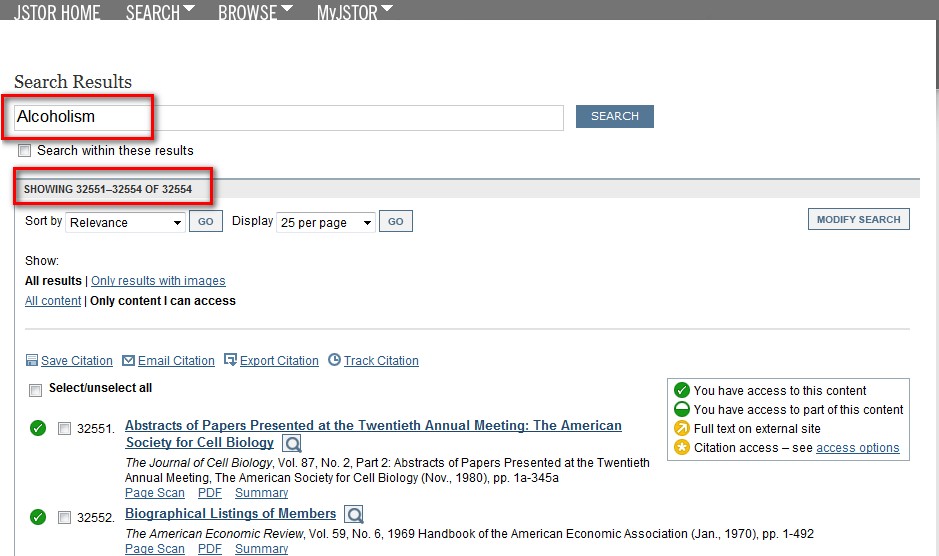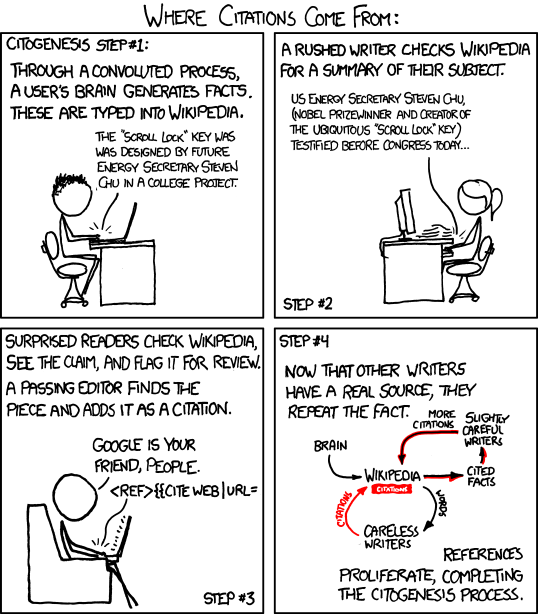Sent to you by IngridThomson via Google Reader:
via Musings about librarianship by Aarontay on 11/27/11
Like many academic librarians, I do various types of presentations, orientations and classes to students.Some students might think we librarians are out of touch that we librarian just use our library catalogues and subscribed databases and know little of Google/Wikipedia etc. As such I always try to mention some "real-world" scenarios to signal that I am well aware of the strong google/wikipedia tendencies of well pretty much everybody. Here are some material I am thinking of using or have made use of in the past.
Google has everything
Lane Wilkinson's Sense & Reference blog points out a very common phenomena that we librarians face at tutorials. Inevitably someone will stand up and say why use the library or subscribed databases when Google has everything? And even if no-one is bold enough to say so, you can bet a lot of people are thinking that.
There are many ways to handle this question, but Lane's answer is most interesting. He simply challenges the person to do a google search. Even though Google say there are thousands of results, when you actually move to the last search engine result page you will find there is usually a lot less, because results are usually capped.
In his example "Alcoholism" he shows that Google shows only 800+ results despite claiming a few million. Even after adding omitted results it shows 1,000. Below shows what I see using Google.com.sg
Google says there are 28 million results, but in actual fact shows only 791, even clicking on repeat the search with the omitted results included doesn't help much. Below shows the results when I click on it.
In comparison most databases (assuming the right type), will show thousands of results (full text only).
Below shows JSTOR
Not that JSTOR is the best database for this , but many students love it, and as the screenshot above shows, there really are 32,000 results!
He concludes
"It's just a rhetorical trick designed to call into question the commonly held belief that you can find morein Google than in the library. And, as a rhetorical device, it introduces valuable questions. Why does Google cap their results? How useful is it to havemillions of results? How does Google decide which 1,000 results to display? Sure, Google may have 50 billion pages indexed, and you may find websites on just about everything, but sometimes it's nice to be able to show that, from a practical standpoint, the library has more."
I was aware of the capped results effect in Google, though I never thought of using it this way. Though Lane views this as a rhetorical trick, (I mean most dont view past the first 10 and even the most obsessive researcher past the first 100), personally I am still mulling over the implications of this capped results. If say I get capped results of 758, if I refine it further does it just work on the set of 758? If so this can be quite a handicap.
xkcd : Where Citations come from
Source: http://xkcd.com/978/
The above picture probably says it all pointing humorously that there is a loophole despite Wikipedia policies of No Original Research. It is important to note that I am generally in agreement with the Daring Librarian, that Wikipedia is not wicked. I could be wrong but I think most librarians agree as well that Wikipedia can be used properly to help start research occasionally.
But still interesting to use this has a starting piece to further discussion on Wikipedia.
Does library use affect student attainment? A preliminary report on the Library Impact Data Project
From Does library use affect student attainment? A preliminary report on the Library Impact Data Project
Again the graph says it all, showing that the students who got first class honours generally used library resources more for both online resources and borrowing of print material, though the effect was stronger for the former. There seems to be almost no correlation for visits to library though.
This is a UK project (University of Huddersfield & 7 partners) and I have been fascinated with their project since I learnt about it. Seems to be a good short slide to quickly show to motivate students :)
Still whenever I mention this, I tend to joke that correlation doesnt not imply causation, so it doesn't mean if you start searching randomly on library databases, you will start increasing your chances of a first class honours :)
Always wondered if we could do this here in Singapore, either at the undergrad level or at the lower levels of A Level students where there is a "Project Work component" required for university admission, where students get a feel of doing some research. Such students would pretty much have to rely on NLB eresources and while there are classes on research held for students by the NLB academy, I am curious whether there is a correlation at this level as well between usage of eresources and perhaps book borrowing and grades received eventually,
Conclusion
Would you use any of these pieces? Why or why not? Anything else you use as talking points?
Things you can do from here:
- Subscribe to Musings about librarianship using Google Reader
- Get started using Google Reader to easily keep up with all your favorite sites





No comments:
Post a Comment